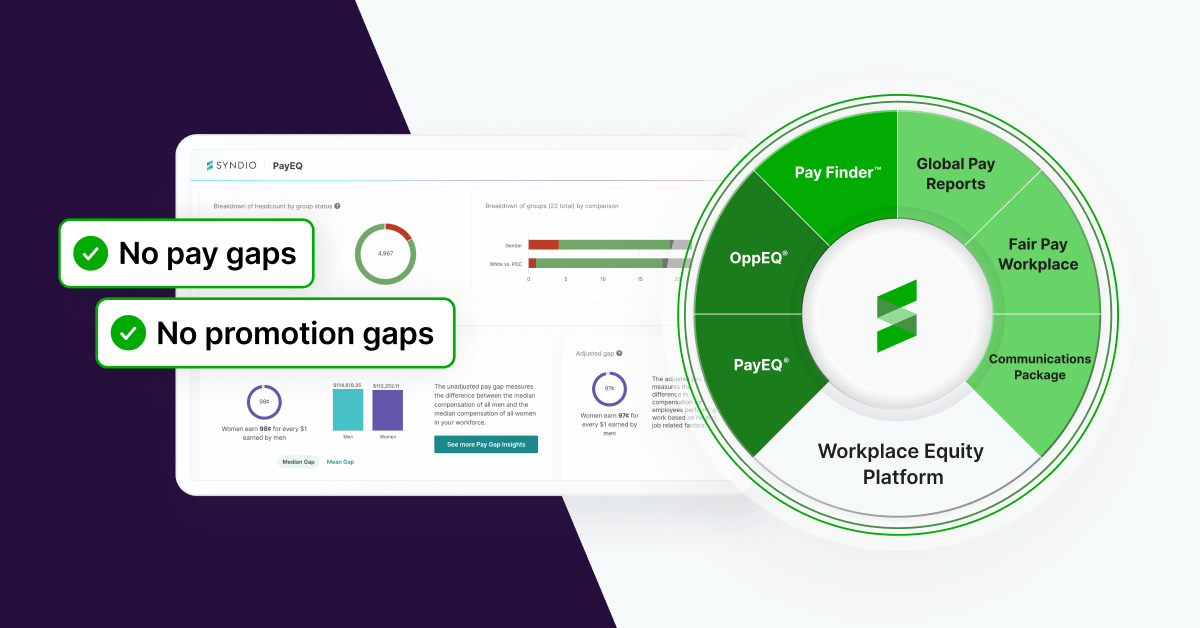Just as we’re adjusting to an all-remote workforce, some employees are heading back to a physical office, and some are staying put at home. The result has been profound changes in nearly every area of business, from technology and logistics to remote workplace culture and employee mental health. Employers seeking to ensure workplace fairness for employees of color, women, and other disadvantaged groups have new hurdles to contend with.
For Syndio’s first Fairness at Work webinar, Syndio CEO Maria Colacurcio moderated a conversation with Brandon Gordon, Director of Human Resources at NerdWallet, and Christina Hall, former Chief People Officer at LinkedIn, about navigating remote work and the transition back to the office in the COVID era. Here’s what they had to say.
How to foster remote workplace culture
Most of us thought this was temporary. To find that balance of creating connectedness and culture without imposing on people’s time and mental health, we’re trying to be cognizant and not try too hard to recreate it because this is really different.
— Brandon Gordon
Now that we expect many employees to be remote for the long haul, how can companies foster a strong remote workplace culture?
- Facilitate informal communication: Create the muscle and intention to make sure side conversations and context are shared broadly (and in writing), so people don’t miss out on potential “hallway conversations” and remain connected and collaborate.
- Reconsider meetings scheduling norms: No same-day meetings, adding15 minute buffers between. meetings, and using daily stand ups that are just a few minutes for check-ins.
- Check and adjust: Whimsical, fun happy hours that were fun at the start of the pandemic may have outworn their welcome.
The impact of remote work on disadvantaged groups and parents
You’ve got to keep your ears open to every type of employee and what they’re dealing with.
— Maria Colacurcio
Our survey showed that nearly half of respondents believe that long-term remote work would have a negative impact on future career advancement due to lack of facetime with management and missing out on the informal proximity and relationship building benefits that come along with it.
What is the consequence for corporate America if women and minorities are more likely to opt for remote work?
- Beware an unintentional divide: Explicit efforts to bridge remote employees with officer workers will help maintain equity.
- Consider what groups are most impacted: Women and minorities — the groups that already struggle with pay disparities and career setbacks — are concerned about going back to the office, but worried about the impact of staying home.
- Practice empathy: Remember that everyone is human and they all have something going on, parents and non-parents alike.
There’s going to be a need for compassion as you think about different groups and how this transition relates to them. If you have employees that are part of groups that are more impacted, they may be more hesitant to go back. I think especially in that return to work we’re going to have to be our most thoughtful.
— Christina Hall
Maintaining remote workplace successes
HR teams have moved mountains this year to transition their whole companies to remote in incredibly short time frames. How can they maintain the changes they successfully accomplished in such a quick turnaround?
- Self-assess regularly: Before updating your policies to accommodate remote work, you first have to know which of your current policies are working.
- Facilitate team check-ins with remote teams: Provide guidance for managers and employees to talk openly about scheduling conflicts in order to make accommodations.
- Consider new strategies for old processes: Many companies are skipping performance reviews this year, but it’s important to identify new ways to recognize performance.
Ensuring pay equity in remote teams
A crisis highlights your principles. Pay is the most important way you show you value someone.
— Brandon Gordon
Ensuring equity is more important now than ever. Economic disaster impacts the most vulnerable. Litigation around pay equity is on the rise. And employees care more about pay relative to similar peers 5.5x more than market pay. How can companies pursue pay equity with so much going on?
- Communicate first why you pay what you pay, not just the pay itself: The “Why” matters and it’s different for remote workers. For example, location can often be a related factor to pay, but employees don’t understand the reasons. Explain it before you make changes.
- Ensure employees feel supported: Pay equity is just an important component of remote workplace culture as it is for office culture. Fair compensation helps keep employees motivated because they feel appreciated.
- Monitor for changes in equity: Ongoing pay equity analysis is crucial and identifying the policies and practices that are working and not working.
Watch the full webinar here. You can check out other past webinars and register for upcoming webinars here.


